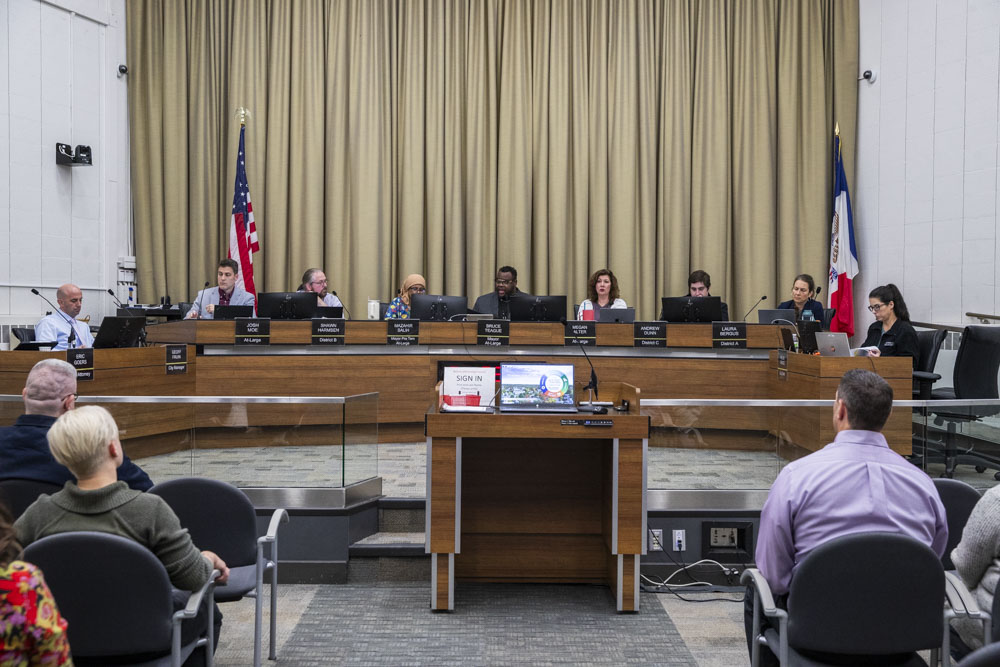Iowa City’s long-running grant program that provides operational funding to area nonprofits serving low-income residents is undergoing changes to streamline the program and its priorities.
Recently, the Iowa City City Council has been discussing changing the way its four recurring grant programs — which includes Aid to Agencies — operate to address community concerns. The Aid to Agencies program sparked the most discourse among councilors, with some saying the program’s two funding pools can cause confusion.
The Aid to Agencies grant program has been running for over 25 years, Erika Kubly, a neighborhood services coordinator for the city, said.
The program currently features a legacy and emerging funding pool. For the legacy pool, the city has identified its legacy organizations that will receive funds each cycle in its City Steps 2025 plan, Kubly said. The legacy pool is intended to be used as a stable source of income for operational expenses, she said.
The City Steps 2025 plan, also known as the Consolidated Plan, helps the city determine where to allocate funding for housing, jobs, and other services for its low-income residents, according to the city’s website. The city is currently working on a new consolidated plan, known as City Steps 2030.
The Aid to Agencies emerging pool was created around five years ago to address the city’s needs, Kubly said. This funding pool has a similar goal as the legacy pool but is reserved for nonprofits that are not receiving legacy funds, she said.
The Aid to Agencies program has seen much change over the last decade. According to a presentation to the city council on Oct. 15, the program has seen a 103 percent increase in funding since fiscal 2016. Kubly said the program’s funds come from a mix of federal funding and the city’s general fund.
The program has seen a 3 percent increase in allocated funding since 2019, Kubly said. In fiscal 2025, the program received over $770,000 compared to nearly $379,000 in fiscal 2016, the presentation states.
At the city council’s Nov. 4 meeting, councilors continued their discussions on potential changes to the grant program. The changes aim to make the program a bit simpler as well as ensure effective and targeted use of its funds.
Kubly presented the council with potential changes to the program that would be implemented in the City Steps 2030 plan, which would go before council in December.
One of the changes is outlining the priorities of what the program will address and fund, Kubly said. Preliminary priorities include:
- Homeless and shelter services
- Food insecurity
- Health care
- Child care and youth services
- Transportation
Additionally, city staff would like to simplify the application and review process, which is arduous and tedious for both applicants and commissioners who review grant applications, Kubly said. This year’s application is over 500 pages long, she said.
RELATED: Iowa City discusses changes to recurring grant programs
One of the largest changes to the program would be to get rid of the legacy and non-legacy, or emerging, pools and instead identify a handful of long-standing nonprofits who would receive direct funding for five years. These organizations must meet various requirements to be selected, including meeting the priorities identified in the City Steps 2030 plan and existing for at least 15 years.
Any other organizations not selected for direct funding would be able to apply for a competitive grant that operates every two years, she said.
These changes would be implemented over the course of several years and would not be immediate, Kubly said.
At the Nov. 4 meeting, Maryann Dennis, the vice chair of the Housing and Community Development Commission, said this change would help fund established and trusted organizations in the community as well as help out the commission itself.
“I would hope that most of us in this community could rely on that well-established, core agencies in this community that have been around for years would be able to satisfy a contract with the city,” Dennis said. “And it would lighten up the load of the [commission] to get these 500-page applications.”
However, some councilors, including Mayor Bruce Teague and Councilor Andrew Dunn, said they would like to see the 15-year minimum for the directly funded organizations lowered. These councilors said 15 years seemed a bit too old.
The City Steps 2030 plan will be reviewed by the Housing and Community Development and city council in December, Kubly said.



